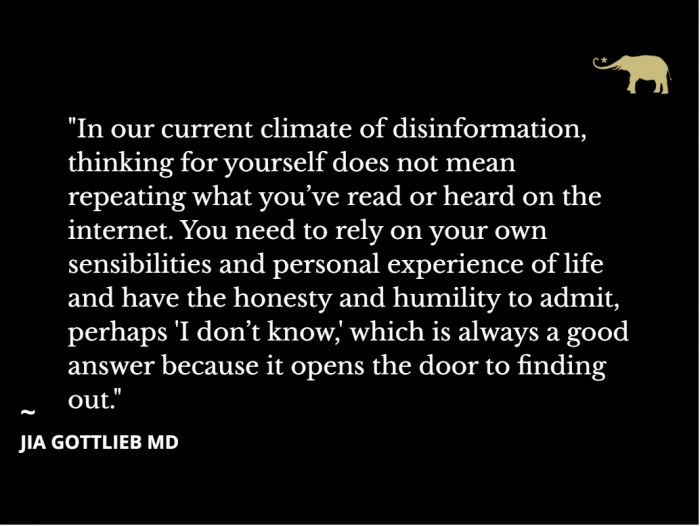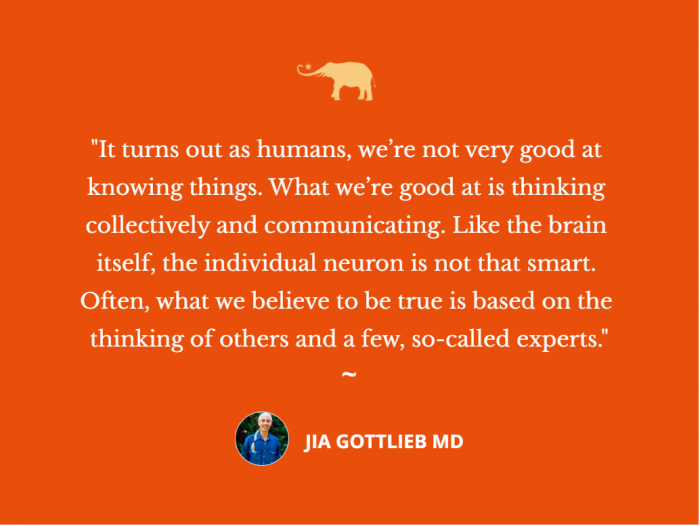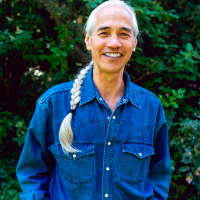We need to stop talking as though covid is over. More than 40% of the country remains unvaccinated. That’s a lot of warm water for hurricane delta. I’m concerned about yet another surge beginning after Thanksgiving (just like last year). https://t.co/R02TJNiCIt
— Prof Peter Hotez MD PhD (@PeterHotez) November 3, 2021
Fundamental to our way of life is honoring an individual’s freedom to pursue happiness.
But what if one person’s pursuit of happiness (pleasure) is the cause of another person’s pain? This dilemma is familiar to those of us who work in the health care industry.
Once, while on a rotation in the emergency room (ER) at San Francisco General, I saw a fellow resident with an unopened pack of Lucky Strikes, in the breast pocket of his scrubs.
Curious, I asked, “What are those for?” With a sardonic grin, he replied, “I keep these for that chronic lunger (often a vet with a bloated chest and thin tattooed arms) who comes rolling into the ER at two in the morning, gasping for breath, so I can pull ‘em out and say, ‘Want a smoke?’”
Aside from being a cruel, teaching moment, it was his passive-aggressive way of saying, “If you want to smoke, why should I have to get up at two in the morning to save your sorry ass?”
I can only imagine the cynicism and gallows humor of the healthcare workers doing their 14-hour shifts and risking their lives (let alone sleep) to save the life of someone who has chosen to remain unvaccinated.
Unlike a personal choice to smoke cigarettes, drive without a seat belt, or parasail/glide, the consequences of which only affect oneself, choosing to forgo vaccination can increase the risk of COVID-19 for others by prolonging the pandemic and increasing the potential for viral mutations.
Herd immunity through vaccination is essentially an altruistic act, exposing the entire herd to a small risk in order to protect the most vulnerable from a catastrophic one. For instance, young boys are routinely immunized against rubella (part of the MMR vaccine)—not to prevent them from getting German measles, a minor illness—but to minimize the risk of a pregnant woman contracting rubella, which could cause a miscarriage, or worse, severe birth defects in her unborn fetus.
Masks in Japan and China are not an issue because in these countries, a person with a cold routinely dons a mask in public to prevent spreading their germs to others. Unfortunately, in the United States, wearing a mask has been politicized and belittled as a sign of bleating sleeplessness.
The other day, a friend invited me to an anti-vax meeting with a group of about 60 liberal, well-intentioned people—a half-dozen of whom I knew personally. They were organizing to recall local school board members who support mask and vaccine mandates. Incensed that their rights were being disregarded, “my body, my choice” and “personal sovereignty” were frequent refrains.
I asked a young mother sitting next to me, “What does it mean to be sovereign?” After some back and forth and a moment’s reflection, she said, “Sovereignty is the freedom to choose what I believe to be true.”
“Fair enough,” I said. As a co-combatant in the war on consciousness—the war to control the narrative of our human experience—I agree we should have the freedom to think for ourselves. Still, something felt off. Afterward, I wondered, “What does it mean to think for ourselves and how do we know what is true?”
In The Knowledge Illusion, neurocognitive scientists Steven Sloman and Philip Fernbach point out we routinely think we know more than we do. In one experiment, the authors asked people, “Do you know how a bicycle works?” Those who said “yes” were then asked to draw a picture of one.
Most of the sketches were of bikes that could not possibly work. It turns out as humans, we’re not very good at knowing things. What we’re good at is thinking collectively and communicating. Like the brain itself, the individual neuron is not that smart. Often, what we believe to be true is based on the thinking of others and a few so-called experts.
“My reality, my truth.” When I was growing up, each evening Walter Cronkite in a calm, friendly voice reported the day’s news on TV. People might have had different opinions, but they were working from the same set of “facts.” These days if you listen to Fox News, you may get a different set of facts from CNN and this divergence is tearing our country apart. In some studies, social media influencers have more credibility than one’s own doctor.
I believe unfriendly state actors and other nefarious organizations are engineering hate, lies, and fears like viral memes to infect and weaken the body-politic—the old divide and conquer stratagem. Democracy is being defeated from within by turning its greatest strength, freedom of speech, against itself.
For democracy to work, there must be transparency and a general agreement on the facts, otherwise known as the truth. In our current climate of disinformation, thinking for yourself does not mean repeating what you’ve read or heard on the internet. You need to rely on your own sensibilities and personal experience of life and have the honesty and humility to admit, perhaps “I don’t know,” which is always a good answer because it opens the door to finding out.
To think for ourselves is to take responsibility for our choices and to do our own due diligence. It requires a willingness to entertain information from diverse sources without accepting them as true. It means demanding full disclosure from our governing bodies and institutions and holding our journalists and news media outlets accountable for evidence-based reporting.
And as for sovereignty, from the old French soverain (L. super “above”) and reign (L. regnum, rex, “king”), it is a worn-out relic best left to the age of paternalistic hierarchies and feudalism.
The idea of being the king and queen of one’s own castle is passé. If we are to survive the global threats that face us, we need to embrace an ecological ethos of cooperation and interdependence. As Benjamin Franklin famously remarked at the signing of the Declaration of Independence, “We must all hang together, or most assuredly, we shall all hang separately.”
If inspired, join me for my free, monthly live Q&A session on the last Wednesday of each month, 12 p.m. MST.


 Share on bsky
Share on bsky






Read 9 comments and reply